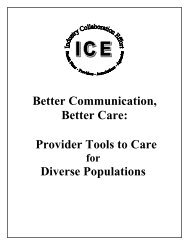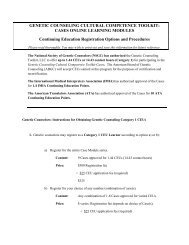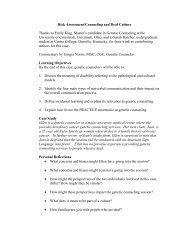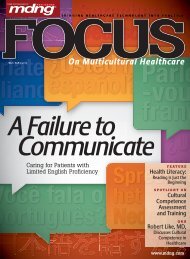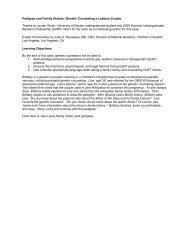Advanced Effective Communication, Cultural Competence, and ...
Advanced Effective Communication, Cultural Competence, and ...
Advanced Effective Communication, Cultural Competence, and ...
Create successful ePaper yourself
Turn your PDF publications into a flip-book with our unique Google optimized e-Paper software.
A Roadmap for Hospitals<br />
Appendix D: Laws <strong>and</strong> Regulations<br />
during hospitalizations appropriate auxiliary aids <strong>and</strong> services<br />
necessary to ensure effective communication for deaf patients or<br />
deaf family members, including qualified interpreters.* The<br />
Maryl<strong>and</strong> hospital had an older system of video interpreting<br />
services available that did not perform well, if at all. The suit alleged<br />
that hospital staff had difficulty setting up <strong>and</strong> operating<br />
the system, the picture was at times too blurry for a patient to<br />
clearly distinguish the arms <strong>and</strong> h<strong>and</strong>s of the video interpreter,<br />
<strong>and</strong> the video camera could not be adjusted for prone patients<br />
so that the interpreter <strong>and</strong> the patient could clearly see each<br />
other’s h<strong>and</strong>s, arms, <strong>and</strong> heads. In addition, the case alleged that<br />
the hospital failed to provide an interpreter for a deaf patient<br />
during hospitalization. The hospital allegedly did not attempt to<br />
communicate with the deaf patient in any way, but rather forced<br />
her hearing mother, who did not know sign language, to function<br />
as a relay person, consecutively exchanging simplistic messages<br />
between her adult daughter <strong>and</strong> the hospital staff regarding<br />
her daughter’s condition <strong>and</strong> treatment.<br />
Gillespie v. Dimensions Health Corp., d/b/a Laurel Regional Hospital<br />
[10] was resolved through a comprehensive consent decree<br />
which included detailed provisions for the implementation <strong>and</strong><br />
administration of a program to ensure effective communication<br />
with persons with hearing disabilities. The consent decree required<br />
the hospital to continue to provide both on-site interpreters<br />
<strong>and</strong> interpreters appearing through video interpreting<br />
services where necessary for effective communication; to provide<br />
other auxiliary aids <strong>and</strong> services as necessary; to modify<br />
medical <strong>and</strong> intake forms to make sure that once a deaf or<br />
hard-of-hearing patient or family member enters the hospital,<br />
the hospital makes a communication assessment <strong>and</strong>, if necessary,<br />
a reassessment of the patient or family member; to maintain<br />
a complaint resolution/grievance procedure regarding the<br />
provision of auxiliary aids <strong>and</strong> services; <strong>and</strong> to train hospital<br />
personnel to accommodate the communication needs <strong>and</strong> preferences<br />
of deaf or hard-of-hearing patients <strong>and</strong> family members.<br />
In addition, DOJ required Laurel Hospital to satisfy<br />
specified performance st<strong>and</strong>ards for its video interpreting services<br />
regarding the quality <strong>and</strong> clarity of the televised video <strong>and</strong><br />
audio, regardless of the body position of the patient, <strong>and</strong> to<br />
train hospital staff to quickly <strong>and</strong> easily set up <strong>and</strong> operate the<br />
system. DOJ also made clear that, except in very limited instances,<br />
medical providers should not ask family members or<br />
other representatives to interpret for a person who is deaf or<br />
hard of hearing because of potential emotional involvement,<br />
considerations of confidentiality, <strong>and</strong> limited interpreting skills.<br />
In 2004, the DOJ settled a lawsuit alleging that Fairview<br />
Health Services failed to provide qualified sign language interpreters<br />
<strong>and</strong> services to deaf patients in United States v. Fairview<br />
Health Services* [11]. Under the agreement, Fairview agreed to<br />
hire <strong>and</strong> make available one or more qualified sign language interpreters<br />
24 hours a day, seven days a week, to provide effective<br />
communication at each of its five hospitals in Minnesota, <strong>and</strong><br />
to pay $188,000 in damages to four complainants <strong>and</strong> $20,000<br />
in civil penalties. Fairview also agreed to rewrite its hospital policy<br />
<strong>and</strong> procedures affecting patients with disabilities, develop<br />
patient <strong>and</strong> visitor information <strong>and</strong> notices in forms that are accessible<br />
to deaf <strong>and</strong> hard-of-hearing patients, <strong>and</strong> conduct comprehensive<br />
training of hospital personnel. †<br />
Section 504 of the<br />
Rehabilitation Act of 1973 <strong>and</strong><br />
the ADA: Other Types of<br />
Prohibited Discrimination<br />
Federal law prohibiting discrimination on the basis of disability<br />
addresses a broad range of issues beyond effective communication.<br />
Section 504 regulates how hospitals that receive federal<br />
funding provide aid, benefit, or service, either directly or through<br />
contractual, licensing, or other arrangements, to individuals with<br />
disabilities. Hospitals are also subject to similar requirements<br />
under the ADA. Title III of the ADA applies to “public accommodations,”<br />
which by definition includes hospitals. Title II of the<br />
ADA covers public hospitals – that is, those operated by state <strong>and</strong><br />
local governments -- as programs of public entities.<br />
Such hospitals cannot take the following actions against qualified<br />
individuals with a disability, unless to do so would result<br />
* This case description is from the DOJ Access for All: Five Years of Progress report, available at http://www.ada.gov/5yearadarpt/fiveyearada1.htm.<br />
† The allegations in the Laurel Regional Hospital case illustrate the problems that can result when a hospital fails to take the necessary steps,<br />
through a video interpreting service or otherwise, to ensure effective communication. Hospitals often mistakenly use family members as interpreters<br />
in non-emergency situations <strong>and</strong> inappropriately rely on lip-reading for complicated medical discussions. In the Laurel Regional Hospital case, one<br />
complainant complained to the DOJ that her mother was often unable to communicate to her what hospital personnel had said, <strong>and</strong> that because<br />
her mother does not know sign language, the patient was forced, often unsuccessfully, to try to read her mother’s lips. The patient said she felt<br />
frustrated, angry, <strong>and</strong> ignored by the hospital.<br />
‡ Similar agreements have been reached between DOJ <strong>and</strong> Greater Southeast Community Hospital in Washington, D.C., St. Francis Healthcare in<br />
Wilmington, Delaware, <strong>and</strong> South Florida Baptist Hospital in Plant City, Florida.<br />
72



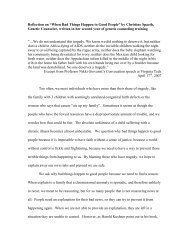
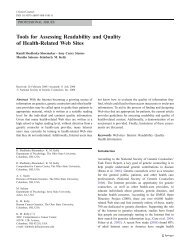

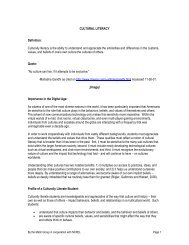
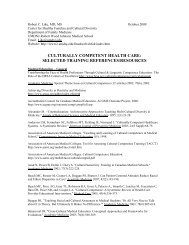

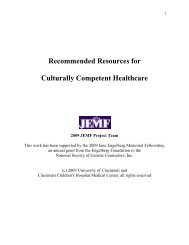
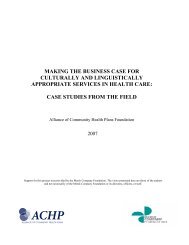
![Breaking Bad News PPT[1] - Genetic Counseling Cultural ...](https://img.yumpu.com/35003134/1/190x146/breaking-bad-news-ppt1-genetic-counseling-cultural-.jpg?quality=85)
